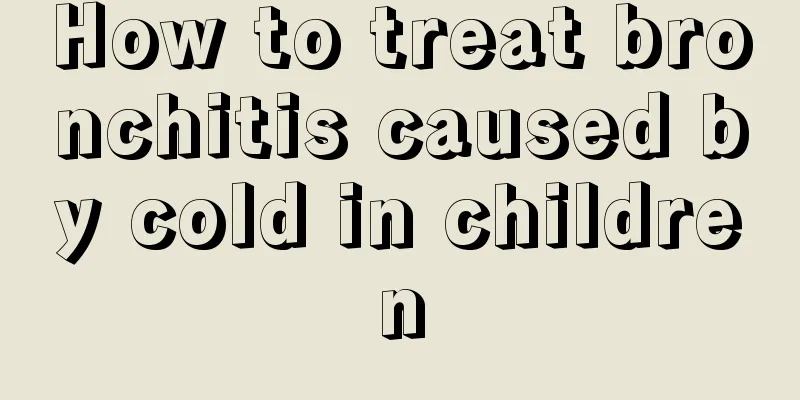How to treat bronchitis caused by cold in children

|
Young children are very susceptible to colds, especially those who are already in kindergarten, who are more likely to be infected by their classmates. If children are not carefully cared for when they catch a cold, it is easy to develop pneumonia or bronchitis, causing long-term coughing, difficulty breathing, loss of appetite, rapid heartbeat and other uncomfortable symptoms. Bronchitis caused by cold in childrenWhat is a chest infection: Chest infections can commonly manifest as pneumonia and bronchitis. Pneumonia affects the air sacs, while bronchitis affects the lining of the bronchial tubes, which becomes inflamed. Bronchitis can cause cramps, coughing, and difficulty breathing.Causes of infection: Chest infections are usually caused by bacteria or viruses. Pneumonia is usually caused by bacteria, while bronchitis is caused by viruses. Sometimes, fungal infections can also cause chest infections.Main symptoms of infection: Chest infection usually starts with a cold, and the main symptoms are runny or stuffy nose, fever, loss of appetite and dry cough. If it gets worse, you may also have difficulty breathing, rapid heartbeat and stop eating.How to treat bronchitis in childrenDrink plenty of milk: Encourage your child to drink plenty of milk and eat dairy products. This will give your baby's body strength to fight infection and prevent dehydration. This will also help reduce fever if your baby has one.Saline nose drops: If your baby has a stuffy nose and is having trouble breathing, try to keep him in an upright position. You can also use saline nose drops to clear your baby's nasal passages and improve his breathing.Steam inhalation: Steam inhalation is also a good way to treat nasal congestion. You can use steam from the bathroom or a humidifier. Inhaling steam can help relieve your child's chest tightness, cough, and nasal congestion.How to prevent bronchitis in childrenMaintaining good hygiene habits: It is very important to maintain good hygiene habits. You must pay attention to the places you and your baby go to and the people you come into contact with. You and your baby should disinfect and wash your hands when you return home. Maintaining good hygiene habits keeps your baby away from polluted air.Keep your home clean: Clean and disinfect your home regularly to prevent your child from catching airborne infections. Most children who get bronchitis when they are young will develop asthma when they are older. Giving your baby a flu shot can also help prevent colds.Keep away from secondhand smoke: If you and your partner have the habit of smoking, keep your children away from secondhand smoke. Smoke can easily lead to bronchitis and cause children to cough.Keep away from sick people: If someone in the family has a cold or cough, keep your baby away from him or her to protect the child from infection. There is currently no vaccine available for bronchitis, so special attention must be paid. |
<<: What are the symptoms of autism in children and how to treat it
Recommend
What causes babies to cough in winter? What can babies eat to get better quickly when they cough in winter?
In winter, many babies will have symptoms of coug...
Why do children love to eat hair? Maybe they are losing too much zinc!
Love to eat strange things, such as biting nails,...
Is a wooden comb good for hair? Will a wooden comb get moldy?
Wooden combs are a type of comb that many girls l...
What is the reason for itching below after childbirth? What should I do if it itches below after childbirth?
After giving birth, mothers can rest assured for ...
Can Bausch and Lomb care solution be used to soak contact lenses? How to open the lid of Bausch and Lomb care solution?
Colored contact lenses can be said to be a type o...
Can babies with eczema be vaccinated? Is it necessary for babies to get imported vaccines?
After the baby is born, in order to enhance its o...
How many days can a newborn baby drink water? When does a newborn baby start drinking water?
My baby was born not long ago and has been fed wi...
What to eat during pregnancy to grow a baby? The secret to growing a baby without gaining weight during pregnancy
Many expectant mothers are afraid that their figu...
Is scarlet fever dangerous in children? How is scarlet fever transmitted in children?
Scarlet fever is a respiratory infectious disease...
How to make osmanthus wine? Can pregnant women eat osmanthus wine?
It is the season of sweet-scented osmanthus again...
Can gestational diabetes cause premature birth? Can gestational diabetes cause dizziness?
Gestational diabetes is a relatively dangerous di...
How long can a newly opened can of milk powder be kept? Misconceptions about milk powder storage
Milk powder is a very common healthy drink. We of...
What to do if the newborn has high jaundice? What to do if the baby has high jaundice?
Many babies will experience high jaundice after b...
How about Dolormin antipyretic juice? Is Dolormin antipyretic juice effective?
The baby's fever is a problem that mothers wo...
Pregnancy check-up time and items When does pregnancy reaction usually start?
Usually, during pregnancy, mothers need to go to ...









